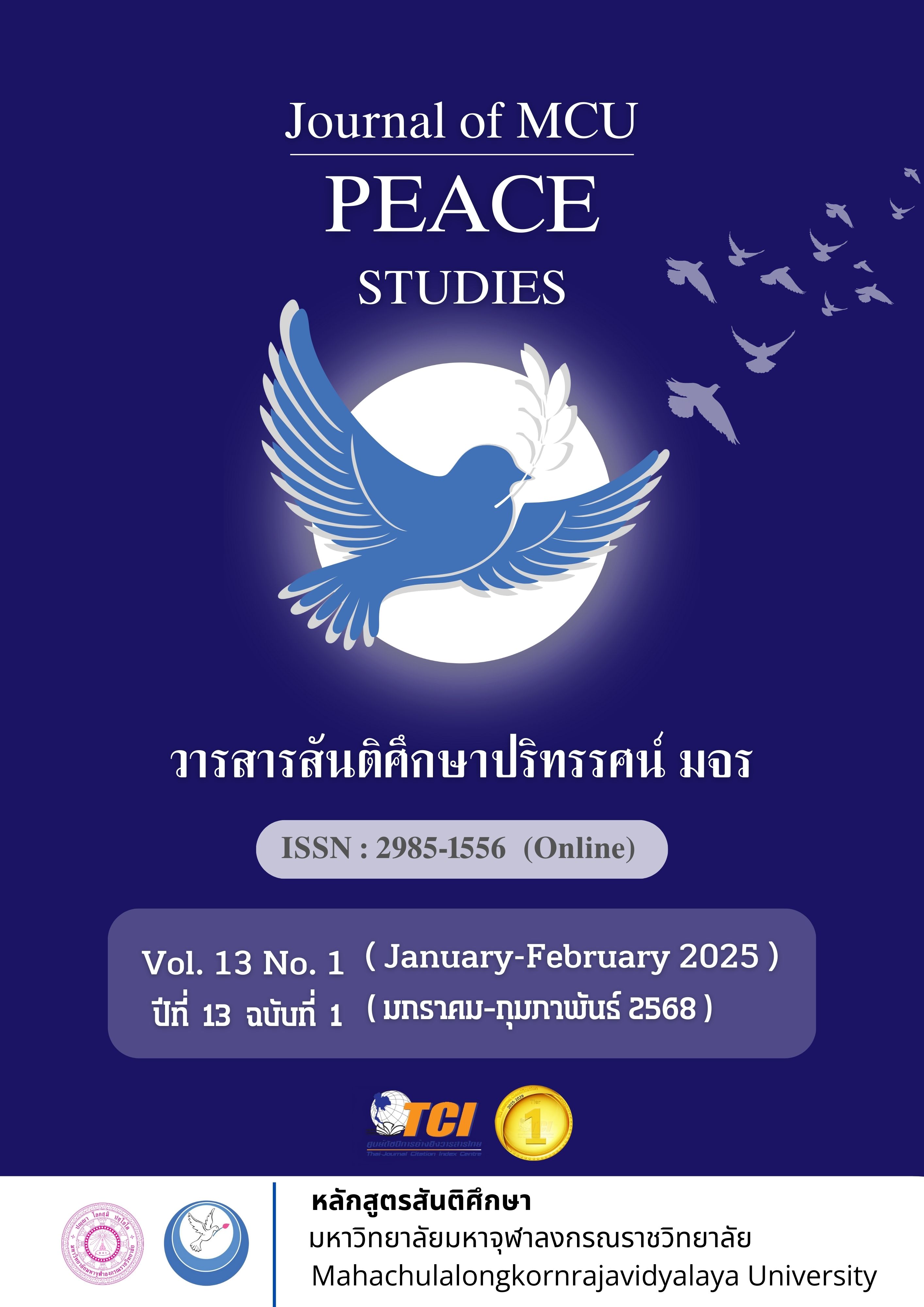Peace Innovation Development of Community Mentoring for Crime Prevention
Main Article Content
Abstract
This dissertation aims to 1) study the context and essential needs in developing community mentors for crime prevention, 2) analyze modern concepts, sciences, and Buddhist peaceful methods conducive to the development of community mentors for crime prevention, and 3) develop and present peace innovations for the development of community mentors for crime prevention. The research uses a mixed methods research design, employing an exploratory sequential design. Qualitative data were collected through in-depth interviews with 25 individuals and focus group discussions with 6 experts. Quantitative data were gathered from a pilot study involving 19 members of the community network around Wat Sarod. The evaluation tools used before and after the experiment included assessments, participatory observation, and reflective techniques using AAR. Statistical analysis was performed using t-tests to compare mean values, with results summarized descriptively.
From the results, the following results are found: 1) The context, problems, and essential needs in developing community mentors for crime prevention include 1) The lack of leaders to concretely address crime issues across various sectors, such as home, temple, and government. 2) The frequent occurrence of drug problems in the community due to easy and cheap access to drugs. 3) echnological advancements, where progress occurs without corresponding development of the mind, leading to the use of media for committing crimes, with films inciting criminal behavior and 4) The lack of morality, where people lack ethical and moral principles, particularly if they do not adhere to the Five Precepts. From these reasons, the essential needs in developing community mentors for crime prevention are 1) Community members' participation as mentors for the community to help monitor and prevent crime in the community, 2) Knowledge of crime prevention theory, and 3) Skills in being community mentors and working collaboratively with networks. 2) Modern theoretical concepts and Buddhist peace principles that contribute to the development of community mentors include (1) Concepts related to crime and crime problems.t, (2) Concepts related to community mentoring and development, and (3) Concepts related to peace innovation. When modern theories are integrated with Buddhist peace principles, such as the Five Precepts, Five Virtues, and the Four Bases of Social Harmony, they help strengthen the community, make it safe from crime, and foster unity and reconciliation within the community. 3) The creation of peace innovation for the development of community mentors to prevent crime involves designing a participatory workshop curriculum. This curriculum integrates needs analysis with modern theoretical concepts and Buddhist peace principles. The training content includes: 1) Mindfulness leads to wisdom; without mindfulness, crime issues arise. 2) Moral role models. 3)Comprehensive knowledge of laws and nearby dangers. 4)Positive communication to foster participation. 5)Creative problem-solving. 6)Writing action plans and community mapping. A pilot study was conducted with a sample group of 20 participants over two days, followed by a 21-day follow-up. The results showed that the average training scores after the experiment were significantly higher than before, with a t-test value of 3.54 at the .05 level. Qualitatively, participants were satisfied with the training and effectively applied the knowledge in their work.
The knowledge derived from this research is encapsulated in the CLAMP model, which consists of five components used to develop community mentors.
Article Details

This work is licensed under a Creative Commons Attribution-NonCommercial-NoDerivatives 4.0 International License.
Views and opinions expressed in the articles published by The Journal of MCU Peace Studies, are of responsibility by such authors but not the editors and do not necessarily reflect those of the editors.
References
Banmuang. (2021). Wat Sarod Opens a Training Workshop “Community mentors end the Problem of Domestic Violence”. Retrieved August 25, 2023, from https://www.banmuang.co.th/news/education/263347
Chaiyapong, A., Ittithanasuphavitch, V., & Weerakul, S. (2018). The Applications by the Cultural Community of Amphoe Sam Khok, Pathum Thani Province in the Crime Control. Journal of the Researchers Association Humanities and Social Sciences, 23(2), 115-125.
Jermrod, P. (2020). Development Participation of People in Crime Prevention in Ayutthaya Municipality Communities, Phranakhon Si Ayutthaya District, Phranakhon Si Ayutthaya Province. Journal of Ayutthaya Studies, 12(1), 41-55.
Mafoo, P. (2019). Knowledge Management in the Implementation of the 5 Precepts to Practice in Tambon Rong Chang, Padad District, Chiang Rai Province. (Master’s Thesis). University of Phayao.
Rat Burana Police Station, (2023). Criminal Case Statistics, 4 Groups, 2023. Retrieved August 30, 2023, from https://khokkloi.phangnga.police.go.th/wp/wp-content/uploads/2024/03/สถิติคดีอาญา-4-กลุ่ม-ตุลาคม-2566-1-1.pdf
Royal Thai Police Office. (2022). Guide to Creating a Network of Public Participation in Crime Prevention. (1st ed.). Bangkok: Suan Dusit University Graphic Site Media and Publishing Service Center.
Royal Thai Police Office. (2023). Criminal Case Statistics, 4 Groups. Retrieved August 30, 2023, from https://data.go.th/dataset/rtp_crimes_stat


